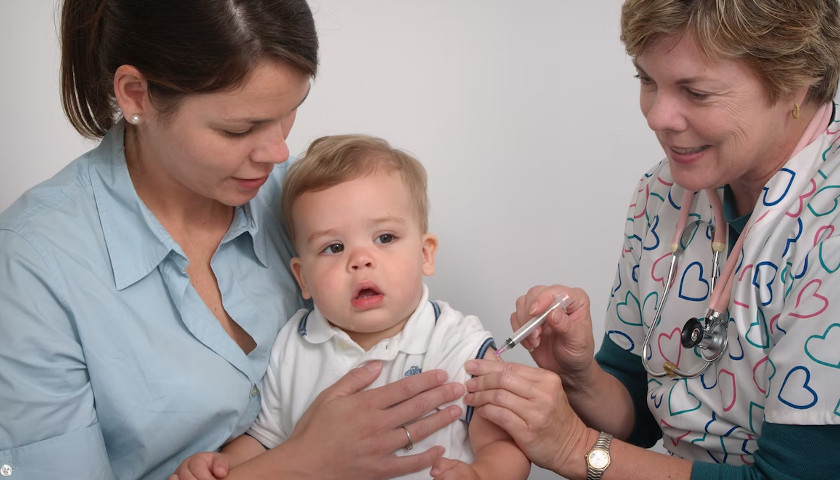A group of Republican lawmakers in the U.S. Senate and House is demanding answers from the Food and Drug Administration (FDA) and its vaccine panel regarding the Emergency Use Authorization (EUA) application for COVID vaccines in babies and young children under 5 years of age.
Though young children without other significant medical issues bear the least risk of serious illness from catching the COVID infection, White House COVID-19 Response Coordinator Dr. Ashish Jha is already planning for the distribution of COVID vaccines for babies and toddlers under 5 years of age as early as June 21 if the FDA and CDC approve.
On Wednesday, Senator Ron Johnson (R-WI) joined Sen. Ted Cruz (R-TX), U.S. Representatives Bill Posey (R-FL) and Louie Gohmert (R-TX), and 14 of their fellow lawmakers in a letter calling for answers from the FDA and its Vaccines and Related Biological Products Advisory Committee (VRBPAC) panel regarding EUA application for the use of COVID-19 vaccines in children under the age of 5.
Our federal health agencies are rushing to approve COVID vaccines for children under 5.
FDA should provide data on medical necessity and a risk analysis of vaccines for these children.
Proud to join @tedcruz and @congbillposey on this.https://t.co/KtPrDBFOPe
— Senator Ron Johnson (@SenRonJohnson) June 9, 2022
The VRBPAC panel will meet on June 15 to consider the authorization of the vaccine for emergency use.
The members of Congress wrote to FDA Commissioner Dr. Robert Califf about their concerns based on the data already known:
A May 2022 CDC study reported that 68% of children 1-4 years of age are SARS-COV2 seropositive – meaning that they have previously had COVID-19. The study also found that for those 5-11 and 12-17, the rates were 77% and 74% respectively. With the Omicron wave in early 2022 and another wave in cases in April and May, it is common sense to presume that these rates are even higher now, with perhaps 80% of children across these age groups being seropositive.
“The broad approach of the CDC and FDA to date has been a one-size-fits-all policy – get the vaccine regardless of age, risk factors, the underlying health of the individual, or previous infection,” the lawmakers continued. “Yet, to date there remain many unanswered questions about these EUA-approved COVID-19 vaccines and only a small percentage of the safety data about these vaccines that are in the possession of the FDA and the manufacturers has been released for review.”
“These mRNA vaccines lack long-term safety studies and may carry unknown long-term risks,” the senators and representatives explained. “Even with respect to near-term acute adverse reactions, the study populations for these vaccines are very small, as it was only with mass vaccinations that the FDA was able to detect serious adverse reactions, particularly among young males.”
Children’s Health Defense also published a video about its concerns regarding the vaccines for babies and young children:
“We believe it is prudent and necessary that the FDA provide answers to a number of questions before approving EUA vaccines for children under age 5, including more than 70% of whom are already seropositive for COVID-19,” continued the lawmakers, and posed a series of questions to Califf, including:
- Why has the FDA recently lowered the efficacy bar for COVID vaccines for the youngest children?
- If approved and widely used among children ages 5 and under, how many lives does the FDA estimate will be saved in this age group over the next year? Given the injuries reported in the FDA’s own VAERS system, how will the FDA evaluate potential tradeoffs of serious vaccine injuries versus serious COVID outcomes?
- CDC reports seropositivity of 68% of children 1-4 years, 77% for those 5-11, and 74% children ages 12-17. With two additional COVID waves since this data was reported and corresponding increases in seropositivity, what percentage does FDA consider herd immunity?
Read all the questions posed to the FDA commissioner by the members of Congress here.
The other signers to the letter are Reps. Ralph Norman (R-SC), Mary Miller (R-IL), Andy Biggs (R-AZ), Chip Roy (R-TX), Dan Bishop (R-NC), Lauren Boebert (R-CO), Andrew Clyde (R-GA.), Thomas Massie (R-KY.), Warren Davidson (R-OH), Jeff Duncan (R-SC), Diana Harshbarger (R-TN), Matt Rosendale (R-MT), Vicky Hartzler (R-MO) and Bob Good (R-VA).
– – –
Susan Berry, PhD, is national education editor at The Star News Network. Email tips to [email protected].




